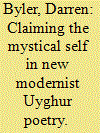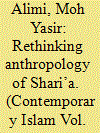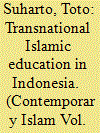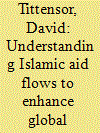|
|
|
Sort Order |
|
|
|
Items / Page
|
|
|
|
|
|
|
| Srl | Item |
| 1 |
ID:
159371


|
|
|
|
|
| Summary/Abstract |
By recuperating the Sufi poetics of the Uyghur past, “avant-garde” Uyghur poets such as Tahir Hamut and Perhat Tursun are claiming a right to speak as heirs to both a religious and a literary tradition. For these modernist poets, finding one’s own way forward through the past is a way of reclaiming the discourse surrounding Uyghur identity, and the cultural symbols built into it, as an extension of the self. By channeling affect in such a way that it appears to derive from conventional Uyghur imagery, these poets demonstrate a measure of self-mastery that restores a feeling of existential security in the midst of political and religious change. This article argues that the purpose of their poems is to force the reader to accept new interpretations of images of Sufi embodiment and spirituality as valid and powerful. It further claims that the new indexing of Sufi imagery in this emerging corpus disrupts the unity of Uyghur poetry in the genres of Chinese Socialist Realism and ethno-nationalist Uyghur tradition, not in a negative process, but in order to create new forms of thought and subjectivity. It forces the reader to interpret the world not by trying to return to mythical Uyghur origins or reaching for a Socialist or an Islamic utopia but instead as a means of self-determination and affirming contemporary life itself.
|
|
|
|
|
|
|
|
|
|
|
|
|
|
|
|
| 2 |
ID:
159370


|
|
|
|
|
| Summary/Abstract |
This article considers the use of emoticons on transnational, English-language Islamic website forums as a case study to examine the shifts in Sunni religious authority, which have accelerated and deepened in the era of computation and new media. It shows the ways in which ordinary Muslims on conservative web forums invoke, deploy, and respond to different kinds of authority, from jurists to site administrators. It focuses first on particular websites’ endorsement of certain emoticons as Islamic (a smiley face with a hijab, e.g.), and then turns to forum users’ debates about emoticon usage. These debates range from questioning the acceptability of figural emoticons to the appropriateness of ‘secular’ emoticons on self-identified Islamic websites. It finds that while users often cite or request fatawa on emoticon usage when disputing with others, they are equally likely to post what they consider relevant hadith, appeal to common sense, or appeal to site administrators. This ground-up approach to engaging with the issue of emoticons gives nuance to what some scholars have termed the “crisis of authority” in Sunni Islam, and suggests that ordinary Muslims find authority in a diverse, sometimes contentious spectrum of locations. Far from being irrelevant to scholarship on contemporary Islam, emoticons are an important locus for understanding how pious Muslims have negotiated interactions in online spaces.
|
|
|
|
|
|
|
|
|
|
|
|
|
|
|
|
| 3 |
ID:
159369


|
|
|
|
|
| Summary/Abstract |
This article explores the contestation over the meaning and uses of shari’a (Islamic Law) in South Sulawesi Indonesia. Its purpose is to shed light upon the importance and limits of shari’a discursive argumentation in Muslim life, and to examine how shari’a is used in contemporary sociocultural and political processes. The escalation of shari’a formalisation after democratization in Indonesia has widely gained scholarly attention. While the existing literature largely focuses on shari’a politics and the shari’a of the elites, this article focuses on the anthropology of the shari’a politics and the varied usage of shari’a in sociocultural processes across different social assemblages. The research was conducted in Bulukumba, a district divided by the initiative for the formalisation of shari’a at district level. The study reveals that Muslims engage and imagine the shari’a in strikingly different ways, many of which are not at all discursive in a manner consistent with fiqh or scholarly legal commentaries. Discursive argumentation is not the only source of authority in Islamic community. It is a point in a vast network of relationships. The experiences of ordinary Muslims in South Sulawesi illuminate that discursive argumentation can be a less direct and less explicit tool than ritualisation to resist shari’ahisation.
|
|
|
|
|
|
|
|
|
|
|
|
|
|
|
|
| 4 |
ID:
159368


|
|
|
|
|
| Summary/Abstract |
This article analyzes how the emergence of transnational Islam with its global network has changed the face of Indonesian Islam. As part of transnational Islam, the Salafi movement has embellished its ideology through the educational sphere, so it is called transnational Islamic education. The Integrated Islamic School and the Institute of Islamic and Arabic Sciences show the ideological nuances in the education process of these two educational institutions. In this context, there is an ideological struggle between both the Egyptian and the Saudian model of Salafi education with the national education based on Pancasila. With the main agenda of the establishment of an Islamic state and putting the Shariah into practice, the Salafi education can pose a threat to global democratic order. Many cases indicate that perpetrators of global radicalism and terrorism are graduates of Salafi model schools. This proves that global democracy is currently in an ideological struggle with transnational Islamic education.
|
|
|
|
|
|
|
|
|
|
|
|
|
|
|
|
| 5 |
ID:
159372


|
|
|
|
|
| Summary/Abstract |
In 2008 the then Organisation of the Islamic Conference established its own Islamic Cooperation Humanitarian Affairs Department (ICHAD) as an alternative to the OECD DAC. Subsequently, aid from ICHAD predominantly goes to Muslims. This is most likely because zakat is one of the five pillars of Islam and regarded as ibadah (worship), from which non-Muslims are excluded. As such, this paper will examine the theology and ethics of giving in Islam (zakat and sadaqa) and explore these aid flows and, and whether there is room for a more inclusive interpretation that can lead to greater integration and co-operation.
|
|
|
|
|
|
|
|
|
|
|
|
|
|
|
|
|
|
|
|
|